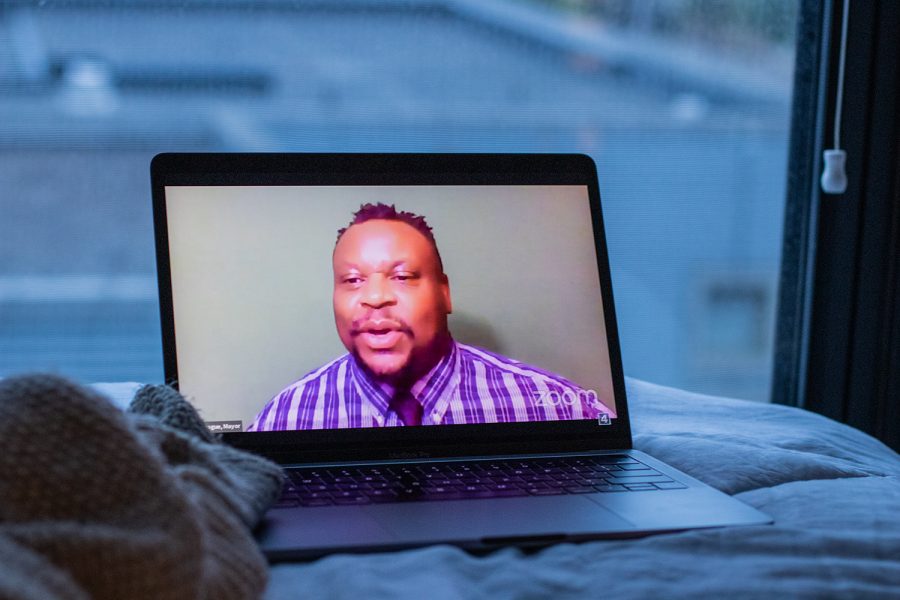New Iowa City ordinance reinforces unbiased policing efforts
The city ordinance will define and prohibit racial profiling and bias-based policing practices in the city code.
Bruce Teague, the mayor of Iowa City, leads the City Council meeting online at 7p.m. on September 1, 2020. Much of the meeting was focused around recent IFR protests and police brutality. Citizens feel the City Council has neglected their wishes.
December 15, 2020
A new Iowa City ordinance prohibiting racial profiling and bias-based policing will be adopted in the city code, supplementing existing Iowa City Police Department policies restricting discriminatory practices by officers.
The ordinance passed a third consideration by the Iowa City City Council Tuesday night, which cements it in the city code. The ordinance earned unanimous support on all three considerations.
City Manager Geoff Fruin said in an interview that putting language in the city code that directly prohibits biased policing practices would be a significant step in setting expectations publicly and increasing transparency regarding how the city operates.
Fruin said the ordinance could eventually aid in the implementation of similar language at a state level.
“I think it’s a big step forward in terms of just expressing our values and our expectations moving forward,” Fruin said. “We strongly believe that this type of language is needed at the state level, and the state will likely consider such proposals later this year. I think by Iowa City moving forward with this, it shows that it can be done and hopefully provides a little bit of momentum heading into the state session.”
City Attorney Eleanor Dilkes, who drafted the ordinance in collaboration with the Iowa City NAACP, said the ordinance was modeled after a similar unbiased policing ordinance implemented in Des Moines in June.
She said the two ordinances weren’t identical, but they shared many similarities.
“Substantively, I would say they’re very similar,” Dilkes said. “The way they do things organizationally and how we do things organizationally some things really fit with us, but the basic premise, for instance, discriminatory traffic stops, are not allowed.
At the state level, Iowa Gov. Kim Reynolds formed the Fueling Ongoing Collaboration and Uncovering Solutions committee (FOCUS) in 2019 and tasked the group this year with developing recommendations that would promote an unbiased criminal justice system statewide.
FOCUS submitted a report to Reynolds on Oct. 29 with recommendations that would require Iowa law enforcement agencies to collect and report on the race/ethnicity of people stopped by officers as well as adopt a statutory ban on any disparate treatment of residents by officers.
RELATED: Iowa Freedom Riders denied seat on Iowa City City Council for second time
President of the Iowa City NAACP Kevin Sanders said during public comment on Tuesday that the organization was supportive of the city adopting the ordinance and that he had been in contact with representatives from law enforcement.
“I have been meeting with the Interim Chief as well as the other chiefs throughout the county, and there are plans to address a lot of the concerns in regard to discrimination and racial profiling,” Sanders said. “I will also say that Iowa City law enforcement has had their issues, but I do know that they are trying their best to make sure that preventative measures are in place.”
ICPD Interim Police Chief Denise Brotherton said the adoption of the ordinance won’t change how the department operates, but will deepen their relationship with the Iowa City NAACP and increase policy transparency.
“Anything we can do to enhance trust within the community, if this helps with that, we’re behind that,” Brotherton said. “But I think you’ll see when you look at those policies that we already have in place, that it does not change operations for us in that sense.
Brotherton said the next step for the department would be reviewing the preliminary plan Fruin presented at the council’s work session on Tuesday regarding the city’s commitment to restructure the ICPD.
“We have several policies coming up for review,” Brotherton said. “Because we are CALEA accredited, we are consistently reviewing policy and making sure our policies encompass our mission and the ideals of our community.”
The Commission on Accreditation for Law Enforcement Agencies (CALEA) recognizes law enforcement agencies nationwide for meeting CALEA standards of professionalism regarding department policy and operation. ICPD is one of 10 agencies in Iowa and four percent of agencies nationally with CALEA accreditation.(i was struggling on how to word this so lmk if this doesn’t make sense)
ICPD was recently subject to a virtual on-site review by CALEA in November, as previously reported by The Daily Iowan.
Iowa City resident Nicholas Theisen, who has been critical of the ordinance at prior meetings, said during public comment that the ordinance would have no significant impact on the state of policing in Iowa City.
“I’ll just reiterate the same points I made last time even though I know you’re all going to pass this anyway…all of these policies were already in place when literally last year an ICPD police officer racially profiled a Black man,” Theisen said. “I can’t change your mind, no one can change your mind…but it’s not going to do anything, and I wish you guys would understand that.”
Theisen was referring to Christopher Kelly, who was arrested last year by an Iowa City police officer for jaywalking under the suspicion that he was carrying a firearm. His charges were dropped in October by a federal judge who said police had insufficient evidence for stopping Kelly.
City Councilor Susan Mims and Mayor Bruce Teague said the ordinance represented the values of the city, the council, and the police department.
“When we’re talking about equitable treatment, if you read the ordinance it really does talk about how we envision and what we plan to do,” Teague said. “This is right up the line as to what I believe we want Iowa City to look like and how we want our Iowa City police to operate.”






